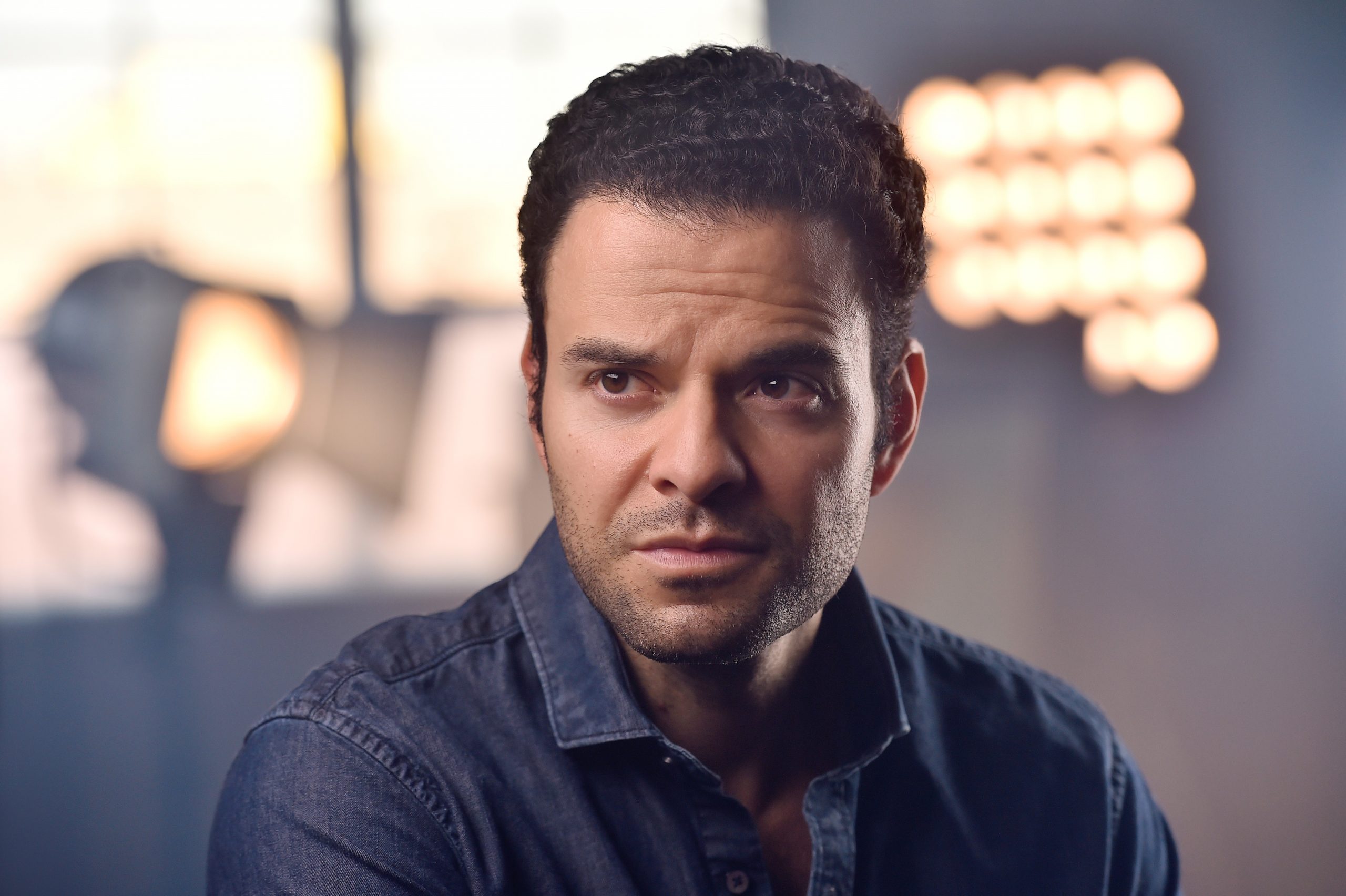You may have seen Alexander Bedria on “The Maeyans” or the hit sh onovan”. He has also written and directed the feature film “The Zim” that tells the story of a farmer struggling to protect his home and loved ones amidst the violent turmoil of the Zimbabwean land seizures. Today we talk to him about his career and also about mental health in the entertainment industry.
That’s My Entertainment (TME): Hi Alexander. Thank you for taking the time to speak with me today.
Alexander Bedria (AB): Of course. Nice to meet you.
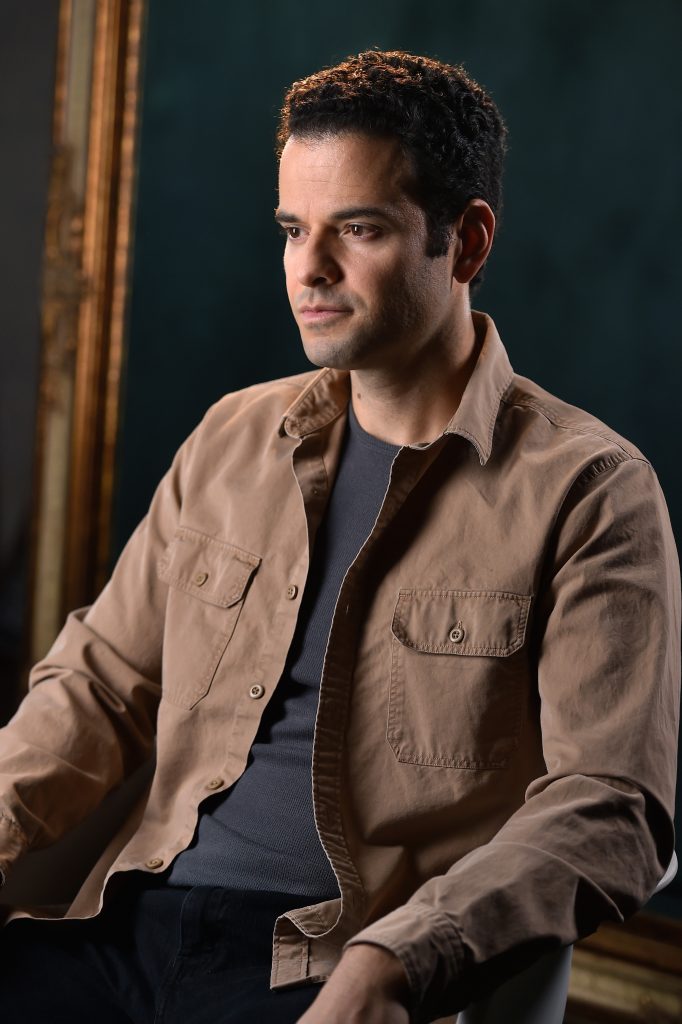
TME: So let me ask you, I know a lot of actors when we first start, we have difficulty with getting paid jobs. How long did it take you to get your first paid gig?
AB: Oh wow! I want to say my first paid gig was when I was 19. I was still in college doing theater and I think it might have been an industrial for a supermarket in Florida where you do these training videos where you’re the person demonstrating how to check groceries out of the checkout line and you do a good version and a bad version. I seem to remember that being my first paid acting gig. I can’t how long it took it might have been like from when I started acting in college it might have been like a couple of months to a year before that landed.
TME: What has been your most challenging role to date?
AB: Let me think… I would say probably the role that I played in “The Zim”, the short film that I had written and directed because I had to wear a lot of hats you know writing and directing while acting and also playing a character who had a distinctly foreign and completely different accent and ways of speaking than I did so I think all of those challenges combined to make a higher degree of difficulty.
TME: “The Zim” was based on a true story right?
AB: It was inspired by a group of different true stories that we combined to create a fictional one.
TME And how was directing? This was your first right?
A B: This was the first time directing at that scale. Yeah, I’ve done a few small things; directing little scenes and experimental shorts but that was sort of my official directorial debut you could say because I had a real crew and full cast and it was though SAG (Screen Actors Guild). It was the first real proper directing job I’ve had.
TME: Would you do it again?
AB: 100% It stoked in me what I suspected was already there which was a desire to shepherd stories in that way. I’ve just been chomping at the bit for the opportunity to do it again.
TME: So what is the biggest life lesson that you feel you have learned while being an actor?
AB: That vulnerability is our true strength.
TME: …which we sometimes think is our biggest weakness.
AB: Absolutely and I can speak to growing in America in our culture as a man of mixed ethnicity, coming from two different cultures then growing up in American culture often for young men we were taught to be masculine and to be strong is to be stoic. It’s to not show emotion. It’s to not reveal vulnerability it’s because vulnerability is weakness. As I’ve gotten older and immersed in my craft as a young man it’s become apparent to me that it’s just not true. It took real strength and courage for people to allow themselves to be vulnerable
And it was a lesson I learned in my work, but ultimately translated into life Often I find as artists, actors specifically, often the lessons that we learn that are fruitful for our craft are wonderful lessons to learn in life as well.
TME: Yeah I’ve gotten into a lot of different types of culture movies and TV because showing men at various levels and stages; even crying to me was much more authentic and I tend to enjoy that more than seeing a man that has to be masculine.
AB: You know I agree with you. I have a theory about that. I think that with a lot of the prominent leading men of the last 40 years often what seems to draw people to these iconic actors seemingly is their strength and their power but I think about Denzel, I think about yes he can certainly be powerful on screen and certainly intimidating but the moments that people seem to connect to are the moments of vulnerability.that he’s had. Even in most powerful strong roles. In Training Day, he certainly was scary and intimidating but there are moments in the film where you see vulnerability; you see an underbelly of something he’s concealing. And my theory is specifically of men and women both but specifically of the man, I think men are drawn to actors who show strength and vulnerability simultaneously because in a way it’s okay for them to feel that empathetically through those performances. Think back to Marlon Brando he was the first time we swathe duality that reality of masculinity and there was a feminine aspect to the work that he did even in his masculine roles like “On The Waterfront” or in “A Streetcar Named Desire”. You see real moments of vulnerability between him and his female castmates. There sort of a subconscious reaching that a lot of men have in this country wanting to connect to that part of themselves, having no way to consciously do that so they watch these performances and it allows them to express their feelings and connecting with that part of themselves.
TME: Well said. So with that, what do you think is the most challenging aspect of being an actor?
AB: Wow. There are so many to choose from. I would say the most challenging aspect of being an actor professionally is generating opportunities. Quite frankly, navigating the business of trying to get jobs and get meaningful jobs. Finding the opportunity to audition, to work, to be in a play, to generate opportunities for yourself… Just figuring out how to do that can sometimes be very challenging even for people who are working all the time because the highs can be very high and the lows can be very low because there is no in-between. Either you are working and you’re on that high of working or you’re not and you are searching for the next opportunity. So I think the most challenging aspect of being an actor is just finding a way to express your art.
TME: So do you think that also plays a role in people’s mental health in this particular field?
Especially that feeling if the opportunities are very few and far between?
AB: Yeah. I do. Absolutely. It certainly affects an actor’s mental health and it’s especially important for people, speaking about actors, it’s certainly is a fickle profession and there isn’t much security to speak of, self-care is important in an actor’s day to day routine. The energy we’re talking about is creative and if it doesn’t find a way to be expressed, then it can cycle within you and can cause rumination that can lead to things like depression and anxiety, insomnia I’d had many friends as well as myself who have had their struggles. I think it’s about knowing what you need to take care of yourself and understanding that things will come and go in this business but if you make it all about results; if you put your worth and your value into what opportunities you’re getting, or how much you get to work, that is just dangerous ground to play on because it becomes about “I’m only happy if I’m getting this.” And if it’s in other people’s hands and this business often it is, then that becomes very dicey for one’s mental health.
TME: So you can start internalizing that you’re not good enough.
AB: Oh sure. That’s a common thing that we all struggle with. An especially you can stoke that fire if do put yourself in someone else’s hands, whether it be a casting director or an agent, or a director or whomever. And this business is not one that welcomes people with open arms. It’s not that the business is cruel, I think that’s often the stigma the business gets. I think it’s because the business doesn’t care. It’s indifferent. That’s neither good nor bad. It’s just everyone whether they are writers, or directors or in casting everyone is holding to what they have and they’re focused on getting their next thing. It’s not personal when you don’t get a role, when an agent doesn’t sign you, when you don’t get an audition, not to take in-person even though a lot of people tend to take it personally. I think salvaging one’s sanity in this business is learning not to take it personally because if you took every time that someone says no to you personally… man, I would think back to the first time when I started in Florida even then I would go drive hours to drop my headshot off to these tiny little agencies all over the state, and I did something like 10 to 20 drop-offs, maybe two of them said: “Okay, we’ll sign you “. If I would have taken those “no’s” personally from the beginning, I don’t think I would have lasted very long at all. You just learn early (hopefully) to go with the stride and keep your head down and focus on what’s right in front of you and then everything will take care of itself.
TME: That’s great. So what are you working on right now?
AB Right now I’m working on a television show project that I can’t say a whole lot about with a writing partner. We are pitching it out to different production companies and networks and going through the process of developing a television series so that’s been a pretty cool progression from making a successful short film and then working on television as an actor. I’ve been lucky to work on some great projects. So now because of the amazing acceptability and availability of the streaming platform, there is a thirst for original content out there, it’s allowing me to use my creativity in a whole new way.
TME: Yeah, thanks to all these streaming services popping up everywhere.
AB: Right there is a hunger for content and you see now these days it’s difficult to do just one thing. There might have been a day when an actor would have come into LA or New York and that’s what they would do. They’re an actor and they pursued it and that was okay. That was enough but these days it’s just becoming more challenging to stay in that lane and be creative because your expression of your work is and who you are, if you are just an actor, it’s completely left in somebody else’s hands but if you develop a project or an idea or if you write or if you work with a writer then you can create your material, create your content. Whatever you want to call it and as an actor, you can fully manifest the role or roles that you want to play. And that way in the very least, whatever you have inside of you has an outlet, otherwise, you’re just going on and if you are lucky auditioning, and if you are very lucky auditioning for roles that express your deepest self as an artist. The odds of that are so… It’s a lottery and I find that it’s far more rewarding to just create your material any which way you can. And because of the accessibility of technology even on an iPhone, you have a full studio within the iPhone itself. There is no reason why a young actor anywhere can’t be writing and creating their material. I think the important thing in that circumstance is just don’t judge it. Just because it might not be exactly what you see in your head as to where you land down the line, know that there is value in every single thing that you create. I firmly believe that.
TME: So I know you were on The Mayans, are you working on any other TV show coming up where we can see you somewhere?
AB: I just met on two TV Shows where I had to sign lengthy non-disclosure agreements on which is becoming par for the course and that’s such a cagey answer and I apologize but I can’t talk about them yet. Hopefully, I can very soon. That’s where things are kind of now; people are very protective of their materials so even when I’m in something or I meet on something, I have to get permission to even announce it.
I’m very fortunate. One thing I’ve always tried to do in my career is selective with the jobs that I do, which is very difficult early on especially because as an actor you just want to work and you want to act. I think it’s also important to say yes to a lot of things but also it’s important to trust your instinct and to know that at the end of the day when you look back you want to be able to say I’m proud of everything well most everything I did. For me, I was driven by the desire to be a part of stories and work with storytellers I admire. Even if I had a small role in something, it was something that was trying to say something, trying to do something. With “Mayans”, I was especially proud of that because it was predominantly a Latin/Hispanic cast and it was a casting which tells that the Latin/Hispanic community is just one homogenous people. We’re very different and I, myself am of mixed ethnicity but fortunately, when I booked this recurring role on Mayans, they revised the character to reflect that. So he became half Argentinean and half German which told me they were paying attention and they did that even before I got the role. So when I got to the table read and I read the new pages I thought “Oh. That’s cool!” There is an effort here to create a sense of realistic diversity in this community and this group of people that you would see in the real world.
TME: Yeah it’s time for more diversity in everything because that’s the way the world is. Especially after living in LA. LA is so diverse and that one of the things that makes it great.
AB: Totally and I think diversity is the most impactful when it is coming from the true place of the originators of the project; the writers, the showrunners. It’s not just tokenism. And speaking to my friends of all different ethnicities, we all have the same feeling which is we love the push for diversity out there; we love that it’s being talked about and we’re seeing a little more of it from the originators but what most of us ride up against is the tokenism and the idea that there is a lot of talk about it. Sometimes it feels like there’s some diversity for diversity’s sake but to me, it’s far more interesting and powerful when it’s coming from the source of let’s say the writers like a diverse writers room or the showrunners even the executives are starting to become more people of color and background. I think that’s when it’s going to shift and change; it is when the people who are creating the shows have a stake in telling these kinds of stories. To me, ultimately great stories are great stories; whether its White, Black. Asian, Pacific Islander… if it’s a great story, then I’m in because it’s the humanity that threads it all together.
TME One last question. Do you have a dream role that you would love to play?
AB: You know maybe if you asked me that question 10 years ago I would have had a very specific answer but I think I am open to whatever surprise comes my way. I sense that whatever those dream roles are, they’re going to be a surprise because they always are. Every job is a surprise. Every opportunity is a surprise… and as I’ve gotten older, it’s a little bit about letting go and saying “I hope that the right thing hits at the right time.” There is a theme that I noticed in my life that the right ones hit at the right time and I’m very much looking forward to what that is. So I’m not sure what the dream role is but I’m looking forward to finding that out.
TME: That’s a good attitude I think. Sometimes we want something so bad that there is resistance. Sometimes we need to put it out there and let it go.
AB: Yeah. It’s like holding on to the sand. I love that metaphor. If you squeeze too hard it comes through our fingers. If you gently open your palm it will sit there. If you squeeze the sand too hard in your palm, what happens is that it goes right through your fingers. I’ve always liked that metaphor and I try to live my life in that way.
TME: Thank you for taking out the time to speak with us today.
The contents of this interview have been edited for clarity.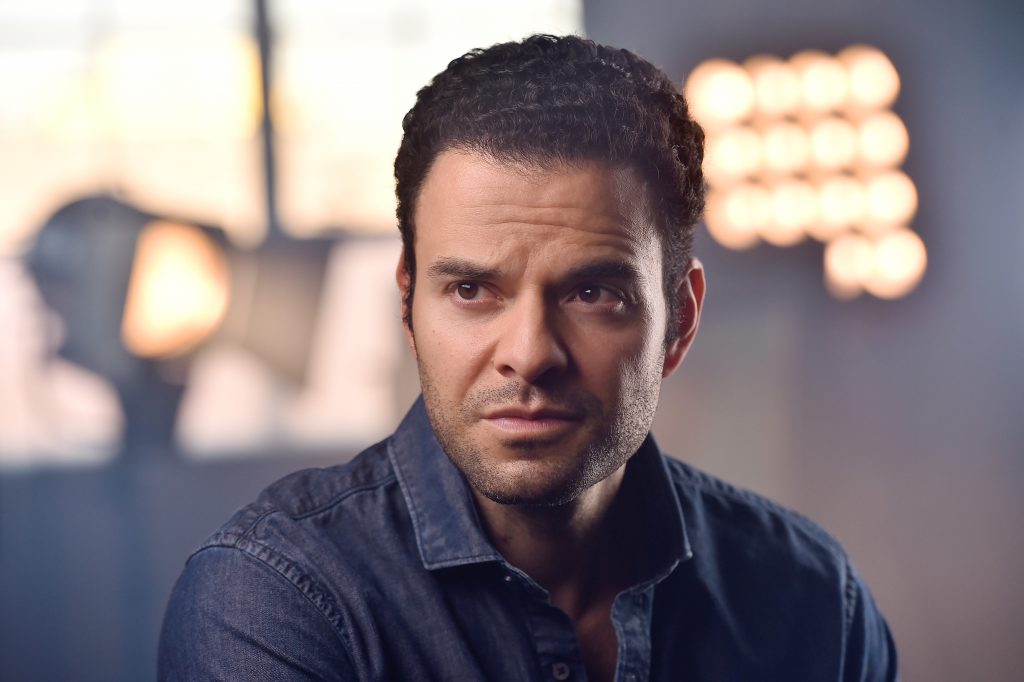
Events
Paramount+ Reveals Official Main Title Sequence for the Upcoming Series TALES OF THE TEENAGE MUTANT NINJA TURTLES
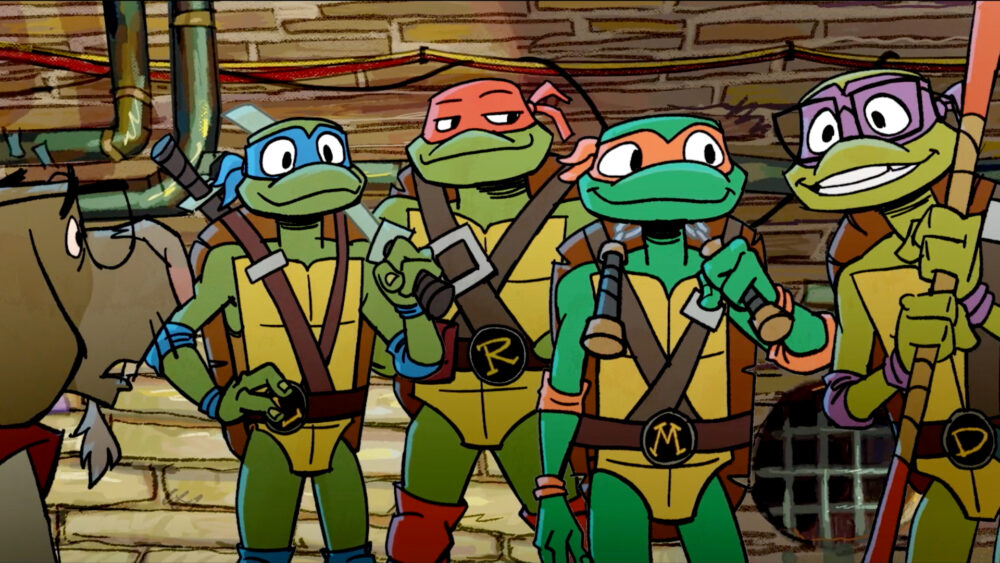
During the TALES OF THE TEENAGE MUTANT NINJA TURTLES panel earlier today at San Diego Comic Con, Paramount+ revealed the official main title sequence for the series. The sequence is composed by EMMY® nominee, Matt Mahaffey, known for his work on Sanjay and Craig, Rise of the Teenage Mutant Ninja Turtles, and Rise of the Teenage Mutant Ninja Turtles: The Movie and much more.
From the studios of the Mutant Mayhem film, the all-new Paramount+ original series TALES OF THE TEENAGE MUTANT NINJA TURTLES explores the adventures of everyone’s favorite pizza-loving heroes as they emerge from the sewers onto the streets of NYC. Leo, Raph, Donnie and Mikey are faced with new threats and team up with old allies to survive both teenage life and villains lurking in the shadows of the Big Apple. The series is produced by Nickelodeon Animation and Point Grey Pictures.
TALES OF THE TEENAGE MUTANT NINJA TURTLES is executive produced by Chris Yost (The Mandalorian, Thor: Ragnarok) and Alan Wan (Blue Eye Samurai, Rise of the Teenage Mutant Ninja Turtles, Teenage Mutant Ninja Turtles [2012 Series]). Production is overseen for Nickelodeon by Claudia Spinelli, Senior Vice President, TV Series Animation, Nickelodeon, and Nikki Price, Director of Development and Executive in Charge of Production.
In addition to the upcoming new series, stream all things Turtles on Paramount+.
Events
Comic-Con 2024: Those About to Die Activation
Events
DISNEY+ CASTS DANIEL DIEMER AS FAN-FAVORITE ‘TYSON’IN SEASON TWO OF “PERCY JACKSON AND THE OLYMPIANS”

in Hall H at San Diego Comic-Con, Rick Riordan and Disney+ revealed that Daniel Diemer (“Under the Bridge”) will star as fan-favorite cyclops “Tyson” in the epic adventure series “Percy Jackson and the Olympians.” Diemer joins Walker Scobell (Percy Jackson), Leah Sava Jeffries (Annabeth Chase) and Aryan Simhadri (Grover Underwood) as a series regular. The Disney+ Original series from Disney Branded Television and 20th Television will start filming its second season next week in Vancouver.
Season two of “Percy Jackson and the Olympians” is based on the second installment of Disney Hyperion’s best-selling book series titled “The Sea of Monsters” by award-winning author Rick Riordan. In the new season, Percy Jackson returns to Camp Half-Blood one year later to find his world turned upside down. His friendship with Annabeth is changing, he learns he has a cyclops for a brother, Grover has gone missing, and camp is under siege from the forces of Kronos. Percy’s journey to set things right will take him off the map and into the deadly Sea of Monsters, where a secret fate awaits the son of Poseidon.
Diemer stars as Tyson – a young Cyclops who grew up all alone on the streets, and finds it difficult to survive in the human world. Shy and awkward, with a heart almost as big as he is, Tyson soon discovers that Poseidon is his father, which means Percy Jackson is his half-brother… and that Tyson may have finally found a home.
Diemer recently starred in the Hulu limited series “Under the Bridge” based off the critically acclaimed book of the same name and a tragic true story of a missing teen girl in Vancouver in 1997. He will next star in the indie “Thug” opposite Liam Neeson and Ron Perlman for director Hans Petter Moland. Daniel was recently seen as the lead in the indie “Supercell” opposite Alec Baldwin and Skeet Ulrich and the lead in the film “Little Brother” opposite Phil Ettinger and JK Simmons. Daniel can also be seen in the Netflix series “The Midnight Club” and recently starred as the male lead in the breakout hit Netflix feature “The Half Of It” from producer Anthony Bregman and director Alice Wu. He is a graduate of Victoria Academy of Dramatic Arts in Vancouver.
Created by Rick Riordan and Jonathan E. Steinberg, season two of “Percy Jackson and the Olympians” is executive produced by Steinberg and Dan Shotz alongside Rick Riordan, Rebecca Riordan, Craig Silverstein, The Gotham Group’s Ellen Goldsmith-Vein, Bert Salke, The Gotham Group’s Jeremy Bell and D.J. Goldberg, James Bobin, Jim Rowe, Albert Kim, Jason Ensler and Sarah Watson.
The first season of “Percy Jackson and the Olympians” is available on Disney+
-

 Interviews1 day ago
Interviews1 day agoInterview With Heroes & Villains Creative Director Doug Johnson
-

 Streaming1 day ago
Streaming1 day agoApple TV+ announces season two for delightful kids and family series “Camp Snoopy
-

 Events1 day ago
Events1 day agoThat’s My E Coverage Of The Adult Swim’s Pirate Parrrty
-

 Events10 hours ago
Events10 hours agoParamount+ Reveals Official Main Title Sequence for the Upcoming Series TALES OF THE TEENAGE MUTANT NINJA TURTLES
-

 Events13 hours ago
Events13 hours agoDISNEY+ CASTS DANIEL DIEMER AS FAN-FAVORITE ‘TYSON’IN SEASON TWO OF “PERCY JACKSON AND THE OLYMPIANS”
-
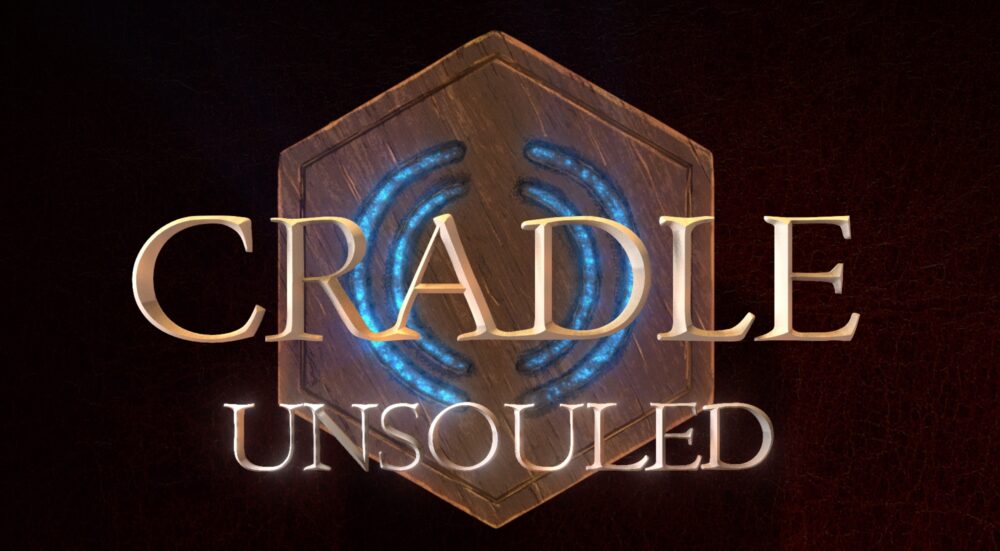
 Interviews14 hours ago
Interviews14 hours agoComic-Con 2024: Will Wight’s Cradle
-
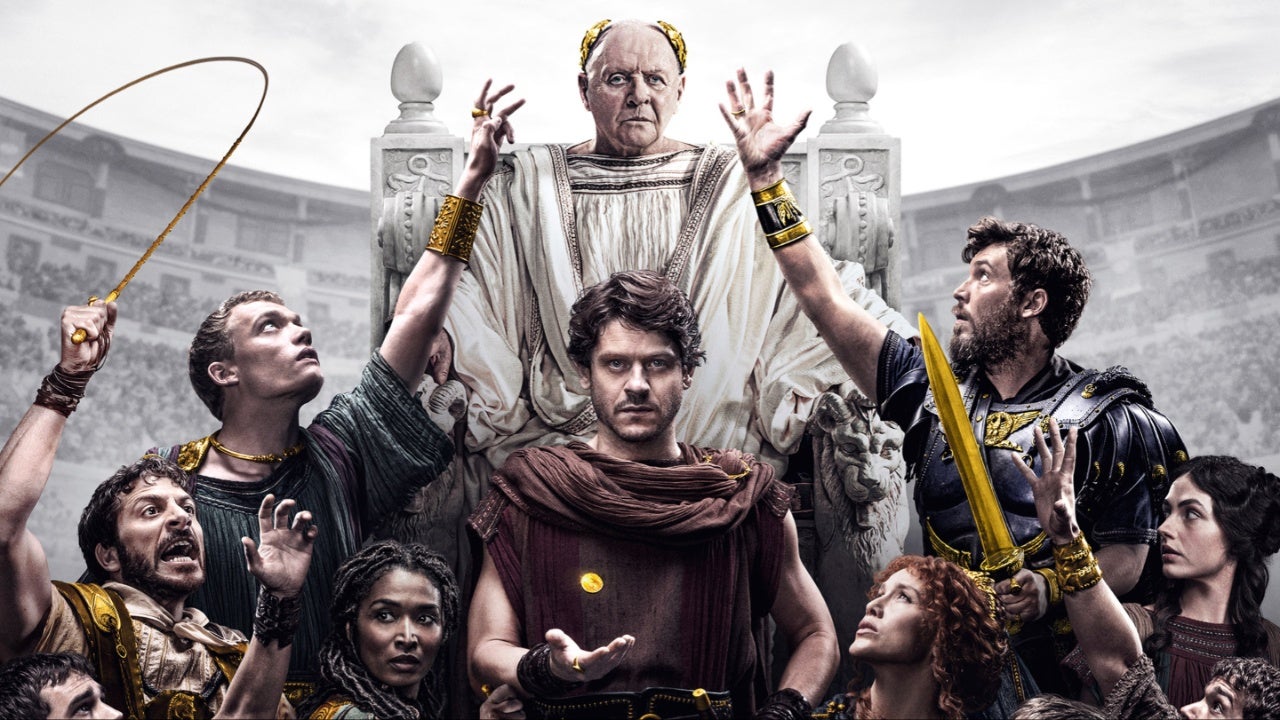
 Events13 hours ago
Events13 hours agoComic-Con 2024: Those About to Die Activation

